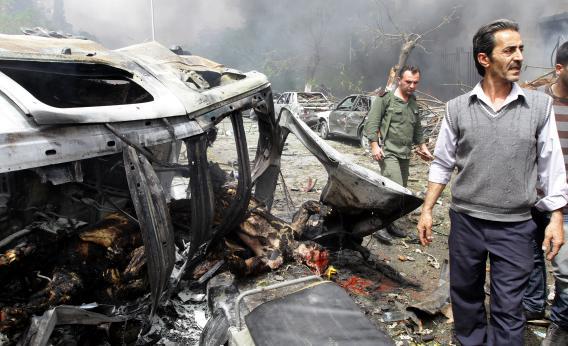I realize some of this is just journalistic shorthand, but I’m seeing an awful lot of headlines touting the Russian-proposed deal for Bashar al-Assad’s government to turn over its chemical weapons as a “solution” for the crisis in Syria, or even for the “Syria conflict.” Whatever happened yesterday was—unexpected face-saving opportunity, diplomatic Hail Mary, future Veep episode plot—it was only a solution for Syria if you’re using the word “Syria” as a shorthand for the Obama administration finding itself in a situation where it feels pressured to bomb a country it really doesn’t want to bomb.
There are still at least 100,000 dead and counting, more than 2 million refugees, escalating brutality from both sides, and violent conflict spreading to neighboring countries. As if to herald the beginning of a new stage in the conflict, the Syrian military bombed rebel positions in Damascus this morning at almost the same time the government was announcing its support for the Russian deal.
I understand that the use of chemical weapons rather than humanitarian catastrophe was the red line in question here, but we could now be entering a phase of the conflict where the international community is involved to a greater extent than ever before but scrupulously avoiding any steps to mitigate the non-chemical violence taking place.
Putting aside the potential difficulty of verifying Syrian compliance with the plan and rounding up dangerous chemicals in the middle of a war zone, how is the credibility of the United States, its allies, and the United Nations—considered so important to maintain in the run-up to a possible airstrike—going to be tested if we’re actively turning a blind eye to atrocities committed with conventional weapons while an ongoing international effort, which would presumably require some international “boots on the ground,” is underway to take away the weapons responsible for fewer than 1 percent of the casualties in this war? There’s been a lot of debate in the last couple weeks about the appropriateness of referring to Kosovo as a historical precedent, but Srebrenica might be the file we need to dust off.
All this is to say that the Obama administration might yet find a way to extricate itself from a political jam, and Syria could fade from the headlines for a while, but nothing is solved and even if imminent airstrikes appear a lot less likely than they did a week ago, the United States will almost certainly be drawn in again.
